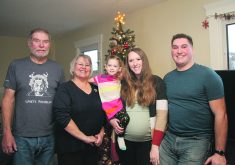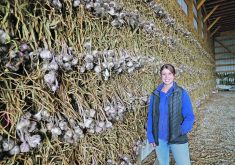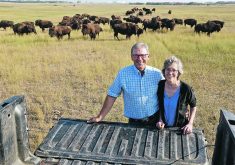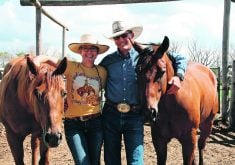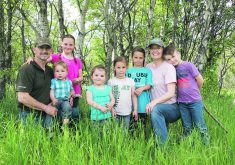Nuffield Scholarship | Money will allow farmer to study farm management and investment models around the world
ROSSER, Man. — Colin Hudon is one of those people who had to grow up quickly.
In the spring of 2002, he graduated from the University of Manitoba with a degree in agriculture and returned to his family’s farm near McAuley, Man.
Colin and his fiancee Dawn were planning to farm three-quarters of land with the support of his parents, Frank and Faye, who ran a grain and cattle farm near the Saskatchewan border.
But the go-slow plan was derailed in the fall of 2002 when Frank developed an aneurysm and died at age 49.
Read Also

Know what costs are involved in keeping crops in the bin
When you’re looking at full bins and rising calf prices, the human reflex is to hold on and hope for more. That’s not a plan. It’s a bet. Storage has a price tag.
Colin was suddenly in charge of the family business, running a mid-sized grain farm and a cow-calf and cattle backgrounding operation.
Colin wanted the farm to thrive and planned to build upon his parents’ success, but his father’s death caused a shift in his thinking.
“My (initial) plan had been to emulate Mom and Dad’s model…. They worked really hard and didn’t necessarily do a lot else,” said Colin, who promised Dawn that he would follow a different path. “We talked and I made that commitment that if we were going to farm … we would have some work/life balance.”
Twelve years later, Colin and Dawn no longer farm near McAuley. The Hudons and their three girls, Taylor, 10, Ashley, 8, and Jordan, 6, now live on a quarter section of land near Rosser, Man., northwest of Winnipeg.
Selling the family farm and relocating to Rosser in 2012 was difficult.
“We had taken that farm as far as we thought we could on our own. At that point, we chose to make some changes,” said Colin, interviewed in the family’s new home.
Dawn, who grew up on a grain farm near Warren, Man., and studied agriculture at the University of Manitoba, said they now have time for non-farm activities.
“Since we’ve been here, Colin has coached (hockey) the last two years,” said Dawn, who worked as an agronomist before they had children.
“We didn’t have that balance for years…. During holidays, I’d pull the fifth wheel myself because … I’m not going to wait all summer, with three kids, for (Colin) to say, OK, I think I can get away.’ ”
After his father’s death, Colin considered scaling down the farm so he could manage the operation by himself.
But he decided that route wasn’t satisfying. He chose to build up the grain and cattle operations with a goal of attracting business partners to ease the workload.
“So that both of those entities were of sufficient scale, so we could bring in management partners or mid-level managers,” he said.
After nine years of efforts, Dawn and Colin realized the plan was not feasible and chose a different path.
Moving to Rosser was an obvious choice because Dawn’s parents, her relatives and friends still lived in the area.
Having made the difficult decision to sell and move, Colin was faced with another quandary: what would he do after farming?
He considered returning to school to earn an MBA but instead joined forces with two friends from his University of Manitoba days to launch a farmland investment and farm succession business called Strategic Agricultural Management Corporation.
Colin said selling his family farm, a mid-sized operation, was an eye opener. Early in the process, he spoke to a realtor about prospective buyers.
“I asked the question, at what point do I grow this thing so large that my liquidity options start to get a bit limited. I expected him to say another five years,” Colin said.
“He said, ‘well, right now you’re probably dealing with about three percent of my clients.’ That took me by surprise…. That’s when some of my own attitudes and opinions about investment dollars and alternative capital in farming started to change.”
A group of investors eventually purchased the farm and Colin said land transfers of this sort, where institutional or private investors purchase farmland from producers exiting the industry, may soon become the norm in Western Canada.
“I’ve heard people say it’s going to be the largest asset transfer in Canadian history. It’s going to happen in the next decade,” Colin said. “It’s almost going to be necessary for some new models and new capital to come into the industry.”
Colin will have an opportunity to discover those new models over the next year.
This fall, he was one of three people in Canada to receive a $15,000 Nuffield Scholarship. He will travel for a minimum of 10 weeks to study the evolution of farmland ownership and farm management in other countries.
Corporate investors buying up farmland is typically viewed as negative, but Colin is committed to approaches that preserve rural communities. For six years, he was a director with the Manitoba Rural Adaptation Council and was a councillor in the Rural Municipality of Archie.
“When people look at the corporate farming … it’s that common story (that) these corporate farms are going to empty out the community…. The fact is you still need people out there to (farm),” he said.
“(And) whether if it’s an individual or a Bay Street investment (firm), if they want to go and farm in any given area … (they) are going to need the support of the (local) community.”
Colin and his partners are also committed to young people. Agriculture grads have many options but SAMC wants to provide one more opportunity as a farm manager.
“When I graduated university, I graduated with some guys that were way smarter and more capable than I am. A lot of them would have loved to go home and become producers but they didn’t have the opportunity,” Colin said.
“We might be able to help some young people that want to be farmers…. Being a primary producer is something that could be attainable to a lot more people.”





